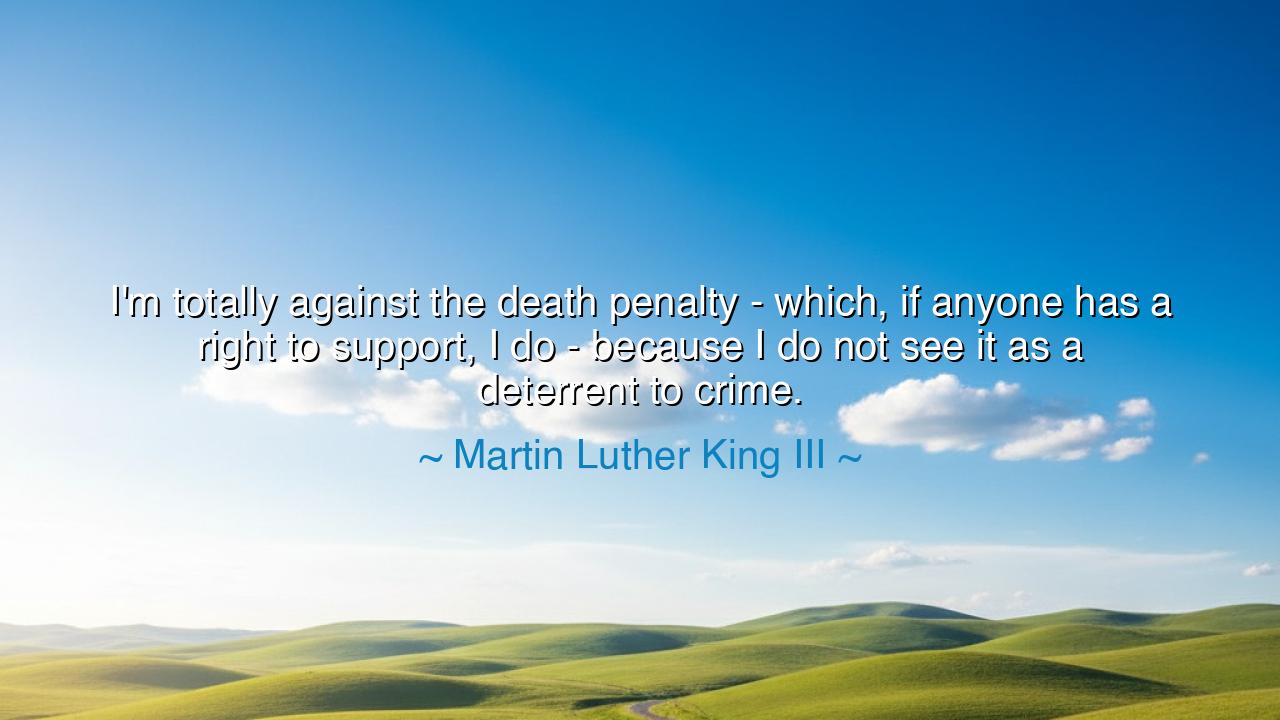
I'm totally against the death penalty - which, if anyone has a
I'm totally against the death penalty - which, if anyone has a right to support, I do - because I do not see it as a deterrent to crime.






“I’m totally against the death penalty—which, if anyone has a right to support, I do—because I do not see it as a deterrent to crime.” Thus spoke Martin Luther King III, the son of the dreamer, the heir to a legacy of peace forged in the fire of injustice. In this declaration, he does more than reject a law—he rejects the illusion that violence can cure violence, that death can bring forth justice, that vengeance can heal the wounds of a broken society. His words echo with both moral conviction and personal pain, for he, above many others, would have cause to seek retribution. Yet he stands in the footsteps of his father, proclaiming once again that love and mercy, not wrath, are the true instruments of renewal.
To understand the weight of this quote, one must know the heart that speaks it. Martin Luther King III is the son of Dr. Martin Luther King Jr., who was slain by an assassin’s bullet in 1968. If anyone could have called for the execution of a murderer, it was this son, who watched his family’s light dim at the hand of hate. Yet, like his father, he refused to let tragedy breed hatred within him. The elder King had said, “Darkness cannot drive out darkness; only light can do that. Hate cannot drive out hate; only love can do that.” The son, in these words, continues that sacred inheritance. His stance against the death penalty is not born of naivety, but of moral strength—the courage to see that justice without mercy becomes cruelty, and that punishment without purpose becomes corruption of the soul.
When he says, “I do not see it as a deterrent to crime,” he touches upon both spiritual and practical truth. For centuries, men have sought to preserve order through fear—believing that the threat of death would keep others from wrongdoing. But the history of mankind shows otherwise. From the ancient empires of Rome to the gallows of medieval Europe, blood has never quenched the thirst for vengeance, nor has death ever truly purified a nation. Violence, when sanctified by law, teaches not reverence for life but contempt for it. In every age, the executioner becomes not a protector, but a participant in the same darkness he seeks to destroy.
Consider, O listener, the example of Mahatma Gandhi, whose nation was steeped in conflict and whose body bore the scars of oppression. When asked how he could forgive those who persecuted him, he replied, “An eye for an eye makes the whole world blind.” So too does King III understand that the death penalty blinds a society—it numbs its conscience under the guise of justice. True justice, he reminds us, is not the taking of life but the restoration of humanity. The purpose of law is not to avenge but to heal; not to mirror the crime, but to transcend it.
And yet, there is something deeply human in the desire for retribution. We must acknowledge this truth, for even the righteous can be tempted by anger. When a crime wounds the heart of a community, the call for death feels like a plea for closure. But what King III reveals is the emptiness that follows such vengeance—the hollow silence that no execution can fill. He speaks as one who knows loss, who has faced the unbearable, and yet has chosen compassion over fury. In that choice lies a lesson for every generation: that strength is not the power to strike back, but the power to rise above.
King’s words also remind us that deterrence is born not of punishment, but of opportunity. The true way to reduce crime is not through killing, but through teaching, nurturing, and reforming. A society that invests more in education than in execution, more in mercy than in judgment, is one that rises toward peace. To cling to the death penalty, he warns, is to confess our own failure—to admit that we would rather destroy than redeem. The noblest civilization is not the one that kills to protect itself, but the one that protects even those who have fallen farthest from grace.
So, O seeker of justice, remember the wisdom of this modern prophet. Do not let anger be your guide, nor despair your counsel. For vengeance is quick and hollow, but mercy endures and transforms. Let hope be your law, and love your sentence. When faced with evil, do not mirror it; overcome it through goodness, as the Kings—father and son—have shown. To reject the death penalty is not weakness—it is the highest form of moral courage, the refusal to let death have the final word. For as long as mercy lives in the hearts of men, humanity itself will not perish.
Therefore, let these words be engraved in your soul: “We must not answer death with death.” Choose instead to build, to forgive, to reform. For the true deterrent to crime is not fear—it is compassion awakened, conscience renewed, and the sacred understanding that every soul, even the fallen, can still be redeemed.






AAdministratorAdministrator
Welcome, honored guests. Please leave a comment, we will respond soon